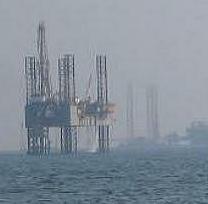 經過墨西哥灣漏油事件,伊朗的業內專家開始思考,他們的國家在發生類似事件的時後將如何因應。
經過墨西哥灣漏油事件,伊朗的業內專家開始思考,他們的國家在發生類似事件的時後將如何因應。
儘管經歷過戰亂的伊朗對陸上漏油處理經驗頗豐,但他們對近海漏油事件的處理能力則較為薄弱,若海上發生重大事故,將可能難以應付。
由於墨西哥灣環境受到破壞的程度十分明顯,伊朗總統艾馬丹加(Mahmoud Ahmadinejad)與伊朗石油業幾位高級官員對抑止漏油事故提供了協助。
由於美伊朗關係冷淡,華盛頓方面幾乎沒有認真的對待來自德黑蘭的建議,更不用提實質的協助了。因此,伊朗國內的一些媒體採取了不同的看法,建議官員們將焦點集中在國內,將美國的問題放下。
這些論點其來有自,納夫特沙爾(Naftshahr)陸上油井大火發生之後──這場大火發生在5月下旬,緊急動員救援團隊花費了5周的時間才撲滅,還影響了一座因墨灣事故而提昇產量達60%的油井。
墨灣漏油事故以及納夫特沙爾大火後,伊朗國內舉行一連串會議,討論在這樣的事件中,如何調整與管理石油業的生產。
在7月下旬的一場高階會議,聚集了伊朗國家石油公司(NIOC)的高層,並提出了兩點建議:培訓處理海上漏油事件的專家,以及取得適當的設備──不論是在伊朗國內製造,或是透過非官方管道由國外所取得。
國家近海石油公司(National Offshore Oil Company)常務董事Mahmoud Zirakchian指出,海底鑽探部門缺乏現代化的方法和技術。Zirakchian應該知道,在1980年代兩伊戰爭期間,不僅是老練的鑽井隊,連一般大眾都學會了艱難的滅火工作。
波斯灣海上鑽井平台受到攻擊之後的大火,平均要花六個月的時間才受到控制,而維修工作則持續數年,在某些情況之下,問題至今仍未解決。這些經驗意為著伊朗的石油從業人員,在1990年伊拉克入侵科威特時,能有效的幫助撲滅油井大火。
不過一位不願透漏姓名的專家指出,伊朗對於撲滅大火方面可能很在行,但是所用的方法卻已經過時。
這名專家說,「我們使用的傳統方法稱為『直接滅火法』,先撲滅井口的大火,然後用混凝土與泥巴灌入,如同他們所說的,將大火悶熄;而現代化的已經沒有人會直接撲滅大火,而是在遠低於井口處鑽一個水平的洞,從那裡灌入混凝土與泥巴。」
墨西哥灣的油井深達1500公尺,另一名伊朗的石油專家說,伊朗處理離岸漏油事件的能力「是90公尺」。
一部分的問題是,伊朗有許多石油業相關設備,包含控制漏油的設備仰賴進口。而6月份最新一輪美國與聯合國對伊朗的制裁,令取得這種科技變得更加困難。鑽井部門的專家指出,「伊朗許多海上鑽井作業依賴外國公司。我們甚至沒有足夠的鑽井設備與海上平台。伊朗最有經驗的焊工也沒有在40公尺以下深度作業的經驗。」
除了過時的技術,伊朗的石油業也面臨人才流失,有經驗的人不斷去別的地方工作。
根據伊朗國家石油探勘公司前執行長莫哈德(Mahmoud Mohaddes)指出,「我們不斷的訓練新人,但是當我們國外以及區域的競爭對手,支付他們數倍的薪水之後,我們無法留住他們。」
除了薪資方面的考量,伊朗的鑽探業的安全紀錄遠低於國際間的標準。從伊朗國家鑽油公司(NIDC)去年發表的一份報告顯示,過去8年間,每1億工時就有20人死亡,而國際的平均值則是3人。
一位NIDC的中階經理作出結論說「如果這個國家想要幫助別人,首先要先努力解決自己國內的問題。特別是,身為國際油業大亨,要更有能力解決自己的問題。」
The oil spill in the Gulf of Mexico has caused some industry experts in Iran to consider how their country would cope in a similar emergency.
While Iran has considerable experience dealing with onshore oilfield fires started during past conflicts, its offshore spill response industry is weaker, suggesting it would struggle to deal with a major disaster at sea.
As the extent of the environmental damage in the Gulf of Mexico became evident, President Mahmoud Ahmadinejad and several senior Iranian oil industry officials offered assistance with capping the leak.
There was little chance the offer would be taken seriously in Washington, given the frosty relationship with Tehran, not to mention the tenor of some of the offers of help.
However, some domestic Iranian media outlets took a different line, advising officials to leave the Americans alone and focus on problems closer to home.
After all, the comments from officials on the U.S. situation came after emergency teams struggled to extinguish a fire at an onshore oil well in Naftshahr.
The blaze, which began in late May, took five weeks to extinguish, and affected a well that had been producing at a rate 60 percent higher than the Gulf of Mexico shaft.
The American spill and the Naftshahr fire led to a flurry of meetings in Iran at which the oil industry's capacity to manage such situations was discussed.
The most high-powered event, in late July, brought together the upper management of the National Iranian Oil Company, NIOC, and resulted in two main recommendations - training up experts to deal with offshore oil spills, and acquiring the right equipment for such an eventuality, either by manufacturing it in Iran or sourcing it abroad through unofficial channels.
Mahmoud Zirakchian, managing director of the National Offshore Oil Company, pointed out that the offshore drilling sector is lacking in both modern methodologies and technology.
Zirakchian should know - his employees include not only veteran drilling teams, but people who learned how to put out major fires the hard way, during the Iran-Iraq war of the 1980s.
Attacks on offshore rigs in the Persian Gulf caused blazes that took an average of six months to get under control, while repair work went on for many years afterwards, and in some cases has yet to get under way.
This experience meant Iranian oilmen were well placed to help put out wellhead fires in Kuwait following the 1990 Iraqi invasion of that country.
But an industry expert, one among several who declined to be identified , points out that Iranians may be experts at fighting fires, but the methods they use are obsolete.
"We use the traditional method known as direct attack. We initially extinguish the fire at the collar of the well, and then fill the collar with cement and mud and, as they say, choke it off," he said. "With the more modern methods, no one attacks the well directly. Instead, they drill a horizontal shaft that connects with the well below the collar, and inject cement and mud from there."
While the Gulf of Mexico well was located at a depth of 1,500 meters, another Iranian oil expert says his country's capacity to contain offshore oil leaks is "limited to depths of 90 meters."
Part of the problem is that Iran has to import much of its oil industry equipment, including items used in containing leaks. The latest round of U.S. and United Nations sanctions in June has made such technology purchases more difficult than ever.
"Much of Iran's offshore drilling operation is reliant on foreign companies. We don't even have enough drilling machinery and offshore platforms," according to an expert from the drilling sector. "The most experienced Iranian welders haven't practiced working at depths of more than 40 meters."
Apart from obsolete technology, Iran's oil industry suffers a constant loss of expertise as skilled staff go elsewhere.
According to Mahmoud Mohaddes, former chief executive of the National Iranian Exploration Company, "We are constantly training up new people, but when our foreign and regional rivals pay them a several times what we do, we have no way of retaining them."
Apart from pay considerations, the Iranian drilling industry's safety record is poor by international standards. A report from the NIDC last year showed that over the previous eight years, the industry suffered 20 deaths per 100 million work hours, compared with an international average of three deaths per 100 million work hours.
A mid-ranking manager in the NIDC concludes, "If this country wants to help anyone else, we should first undertake efforts to solve our own domestic problems. The international oil giants are more than capable of resolving their own problems."
全文及圖片詳見:ENS報導



